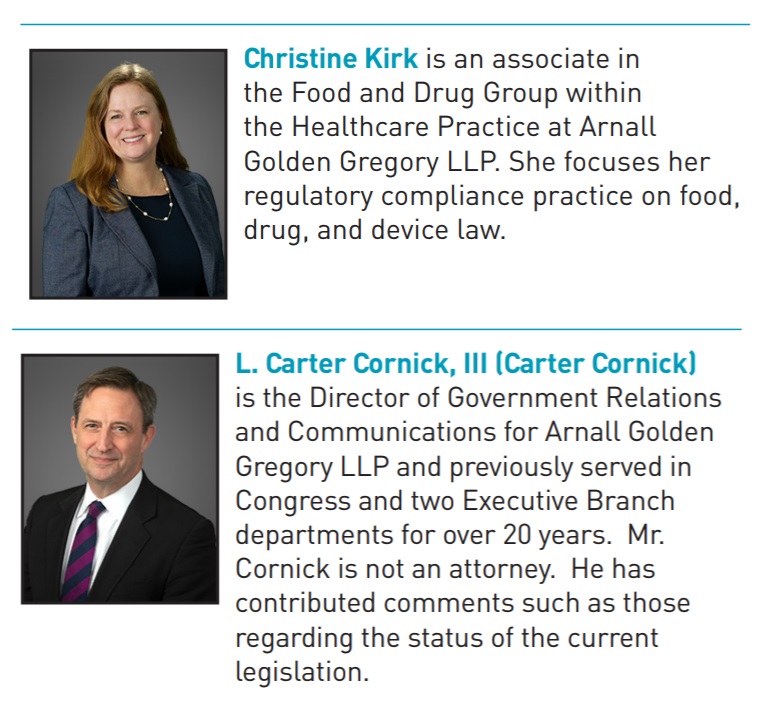
Over-the-Counter Drug Monograph Reform Legislation in the 116th Congress
by Christine Kirk and Carter Cornick

Recent developments in Congress deserve the attention of companies or other stakeholders interested in over-the-counter (OTC) drug products. Major legislation addressing comprehensive reform of the OTC drug monograph process, which nearly passed last year, has been reintroduced and is well on its way toward passage in the current Congress.
FDA, Congress, and other stakeholders have been working toward OTC monograph reform for a number of years, and related legislation could be enacted during this Congressional session. This legislation may be of particular interest to businesses with current or potential future OTC drug monograph products, given the user fee and potential non-patent market exclusivity provisions that are included along with monograph reform in the proposed legislation.
The bill may also be of interest to companies with products that may inadvertently fall under FDA regulation of OTC drug products due to marketing claims or other reasons (e.g., certain cosmetics and other personal care products with drug-like claims). Additionally, there are provisions specific to sunscreen ingredients covered by the Sunscreen Innovation Act of 2014 (Pub. L. 113-95) (SIA). This article provides a high-level overview of relevant parts of the OTC drug monograph system, a summary of related provisions of the proposed legislation, and some observations and considerations for those with OTC drug products.
Background
As noted above, this article is focused on big picture highlights and does not address OTC drug monographs in detail. However, some key background points about current regulation of OTC drugs include:
- FDA regulates both prescription and nonprescription drugs, including OTC drug products.
- OTC drug monographs establish conditions of use under which an active ingredient or combination of ingredients has been determined to be generally recognized as safe and effective (GRASE) for use without supervision by a health care provider.
– A number of monographs have not yet been finalized, and are in “tentative final” or stayed status. - If an OTC drug product meets the applicable monograph and is GRASE, it is not considered a “new” drug and, thus, does not require FDA prior approval for marketing.1
The following items are particularly relevant to the changes proposed in the pending bill:
- Current law requires OTC drug monographs to be proposed and finalized through notice-and-comment rulemaking, which can be extremely time-consuming and resource-intensive. The reform measure would end the rulemaking requirement. Instead, monographs would be issued by administrative order.
– Changes to existing monographs, such as to reflect new scientific or safety information, also require rulemaking. The reform bill would permit changes to be made through the administrative order process. - OTC-related work is not currently supported by user fees (i.e., user fees are not required to market these products). The new bill would include user fee provisions to support OTC drug work.
- Under current law, there is no pathway for market exclusivity for OTC drug monograph products. However, the reform measure has provisions that would open this door for certain products.
Status and Summary of the Proposed OTC Monograph Reform Legislation
Current Status of H.R. 269
As the 115th Congress drew to a close last year, OTC monograph reform legislation was nearly enacted.2 Bipartisan House and Senate support was strong enough and broad enough that the OTC bill was a candidate for final passage to be sent to the President for approval. However, typical “end of session” action to move measures like the OTC reform bill—e.g., as a rider to another bill—were not available due to the partial federal government shutdown.
In the new Congress, the bipartisan support for OTC reform has carried forward. By January 8, 2019, the OTC monograph reform titles (the “Over-the-Counter Monograph Safety, Innovation, and Reform Act of 2019”) were included in H.R. 269 (the “Pandemic and All-Hazards Preparedness and Advancing Innovation Act of 2019”), which the House passed overwhelmingly. On January 10th, the Senate leadership advanced the legislation, making H.R. 269 available for full Senate approval. Since the House-passed measure reintroduced the provisions fully agreed to by both chambers weeks earlier, Senate leadership determined that there is no need for a separate Senate bill or additional review by Senate committees or subcommittees. As of March 19, 2019, the bill remains on the Senate Legislative Calendar under General Orders.
While it is not possible to say when (or if) the OTC monograph reform legislation will be approved by the Senate and signed by the President, it is noteworthy that passage is possible sooner than would normally be expected due to the broad bipartisan and bicameral support for the bill.
Key OTC Monograph Reform Provisions of H.R. 2693
The pending OTC monograph reform legislation includes provisions that would make significant changes to the current drug monograph system. Among other provisions, major reforms include:
- Monographs issued by order, rather than rulemaking
– The bill authorizes the Secretary of HHS to issue an administrative order to propose, finalize, or change an OTC drug monograph.
– The administrative order process is generally faster than notice-and-comment rulemaking. This is expected to make the OTC monograph process more efficient.
– The bill provides for transparency, fairness, accountability, and appeal rights related to the administrative order process (e.g., public notice, hearings, and judicial review). - User fees
– The bill would establish a user fee program for OTC drug products.
– Fees would include facility fees and fees for certain monograph requests (e.g., requests that the agency issue a new drug monograph order or change the contents of an existing monograph).
– Fees would support review of monograph requests, inspection of OTC facilities, and other OTC drug-related activities. - Provisions addressing the status of currently marketed OTC drug products
– The bill addresses what would happen to currently marketed OTC drug products upon enactment of the OTC monograph reform legislation.
– The result for each product would depend on the existing monograph status (e.g., final, tentative final, proposed) and on the GRASE category of the OTC active ingredient or combination of ingredients (e.g., Category I-GRASE or Category III-more data needed).
u Currently marketed OTC drugs that are in compliance with a final monograph, and those classified in Category I under a tentative final monograph, would generally continue to be considered GRASE and not be considered “new” drugs, so long as they meet other applicable requirements. - Limited exclusivity for certain OTC drug products
– The bill would authorize market exclusivity for up to 18 months for qualifying OTC drug products that:- contain an active ingredient not previously incorporated in a monograph; or
- provide for a change in the conditions of use of a drug, for which new human data studies conducted or sponsored by the requestor (or for which the requestor has an exclusive right of reference) were essential to the issuance of the monograph order; and
- meet other applicable requirements.
- Provisions related to certain proposed sunscreen ingredients (interaction with the SIA)
– The bill addresses the interaction of sunscreen orders issued under the SIA with the provisions of the OTC monograph reform legislation.- Sponsors that have received SIA-related proposed orders regarding sunscreen ingredients that were previously proposed as GRASE for OTC use would have 180 days from enactment of the new legislation to determine whether to continue within the SIA framework or transition to the new OTC monograph process.
- General regulations continue to apply
– Except as specifically provided, the bill does not supersede regulations establishing general requirements for nonprescription drugs (e.g., good manufacturing practice requirements).
Observations
- Passage of OTC drug monograph reform legislation could occur at any time during the two-year Congressional session. While enactment is not guaranteed, the bill could be brought up for a vote at any time that the Senate leadership determines is appropriate.
– Now is a good time for companies with OTC drug products to consider how the proposed legislation may affect them. Among other things, companies should confirm which type of monograph covers each of their OTC drug products (final monograph, tentative final monograph, proposed monograph, advanced notice of proposed rulemaking) and which category applies to the OTC active ingredient(s) or combination of ingredients (e.g., I-GRASE or III-more data needed). This is relevant to the status of currently-marketed products under the legislation.
– Companies with OTC sunscreen products may want to review the provisions of the bill regarding the interaction of the SIA and OTC monograph reform provisions, particularly if the company is a sponsor of, or otherwise interested in, sunscreen ingredients that are the subject of proposed orders issued under the SIA framework. - While certain provisions of the OTC monograph reform legislation are relatively clear (e.g., if the proposed bill is enacted, there will be user fees for OTC drugs), the details of implementation and the potential downstream effects of OTC monograph reform remain to be seen. For example:
– How (and how soon) will FDA transition from the current drug monograph rulemaking process to the proposed order process?
– What will happen with regard to currently-marketed OTC products that may have a status change under the OTC monograph reform legislation? Will FDA provide an additional compliance period or otherwise exercise enforcement discretion?
– What are the details of the proposed exclusivity provisions? How might current and future OTC drug products be affected? - There are also numerous regulatory developments of interest in the OTC drug product area. For example, in February 2019, FDA issued a proposed rule that would revise the OTC sunscreens monograph and related regulations.4 This proposed rule has significant implications for OTC sunscreen products.
– Companies with OTC sunscreen products should carefully review the proposed rule and determine both how it could affect them and if they would like to submit comments. Such companies may also want to consider the potential interaction of the pending OTC monograph reform legislation with the sunscreens proposed rule and other relevant information. Comments on the proposed rule are due by May 28, 2019. - In 2018, among other guidance documents, FDA issued draft guidance on innovation for OTC products and draft guidance on maximal usage trial (MUsT) studies of product absorption studies in the topical OTC product context.5 The draft guidance on OTC innovation discusses FDA consideration of whether and how to make certain nonprescription products available on a nonprescription basis, subject to specific limitations and safeguards. The draft guidance on MUsT studies addresses FDA’s current thinking on the need for data about the extent to which a topical active ingredient may be absorbed through the skin, and appropriate testing to provide such data.
– Companies with prescription products that may be appropriate for non-prescription use may want to consult the draft guidance on OTC product innovation and watch for final guidance as well as potential rulemaking, as indicated in the FDA statement issued with the draft guidance.6
– Companies with current or potential future topical OTC products (e.g., sunscreens, antiseptics) may want to review the draft guidance on MUsT studies and watch for final guidance in this area. - There are also recent developments in the broader area of non-drug OTC products. For example, there have been notable recalls and alerts related to cosmetics and supplements, cosmetics legislation has been introduced (S. 726), and FDA has announced a public meeting regarding supplements (to be held on May 16, 2019). In addition, the legal and regulatory landscape for products containing cannabidiol (CBD) and other active ingredients related to marijuana and hemp continues to be in flux at both the federal and state level.
– Companies should continue to follow legislative and regulatory developments relevant to their products. - Finally, FDA and other regulators, such as the U.S. Federal Trade Commission (FTC), continue to be active in OTC product enforcement, with a number of notable consent orders, FDA Warning Letters, and other actions in recent years.
– Companies with drug or non-drug OTC products of any kind (e.g., OTC drugs, cosmetics, supplements, homeopathic products) may want to take this opportunity to update or refresh their understanding of the existing OTC regulatory landscape and to confirm that their policies and practices are in compliance with current requirements.
- We note that OTC monograph drug products are subject to other FDA requirements, such as those related to good manufacturing practices, labeling, and establishment registration and product listing.
- See “Over-the-Counter Drug Safety, Innovation, and Reform Act of 2018” (H.R. 5333; S.2315).
- OTC monograph reform is part of a larger bill addressing pandemic preparedness (H.R. 269). While those provisions are outside the scope of this article, readers engaged in work related to medical countermeasures and pandemic preparedness (e.g., developing certain antibiotics and vaccinations; preparing health facilities and providers to handle epidemic diseases) may be interested in the pandemic preparedness provisions of H.R. 269.
- See FDA, Sunscreen Drug Products for Over-the-Counter Human Use (84 Fed. Reg. 6204; Feb. 26, 2019); https://www.federalregister.gov/documents/2019/02/26/2019-03019/sunscreen-drug-products-for-over-the-counter-human-use or https://www.govinfo.gov/content/pkg/FR-2019-02-26/pdf/2019-03019.pdf .
- FDA, Draft Guidance for Industry, Innovative Approaches for Nonprescription Drug Products (July 2018), available at https://www.fda.gov/downloads/Drugs/GuidanceComplianceRegulatoryInformation/Guidances/UCM613666.pdf, and FDA, Draft Guidance for Industry, Maximal Usage Trials for Topical Active Ingredients Being Considered for Inclusion in an Over-The-Counter Monograph: Study Elements and Considerations (May 2018), https://www.fda.gov/downloads/Drugs/GuidanceComplianceRegulatoryInformation/Guidances/UCM608356.pdf.
- See FDA, Statement from FDA Commissioner Scott Gottlieb, M.D. on new efforts to empower consumers by advancing access to nonprescription drugs (July 2018), https://www.fda.gov/NewsEvents/Newsroom/PressAnnouncements/ucm613692.htm.
Update Magazine
April/May 2019







